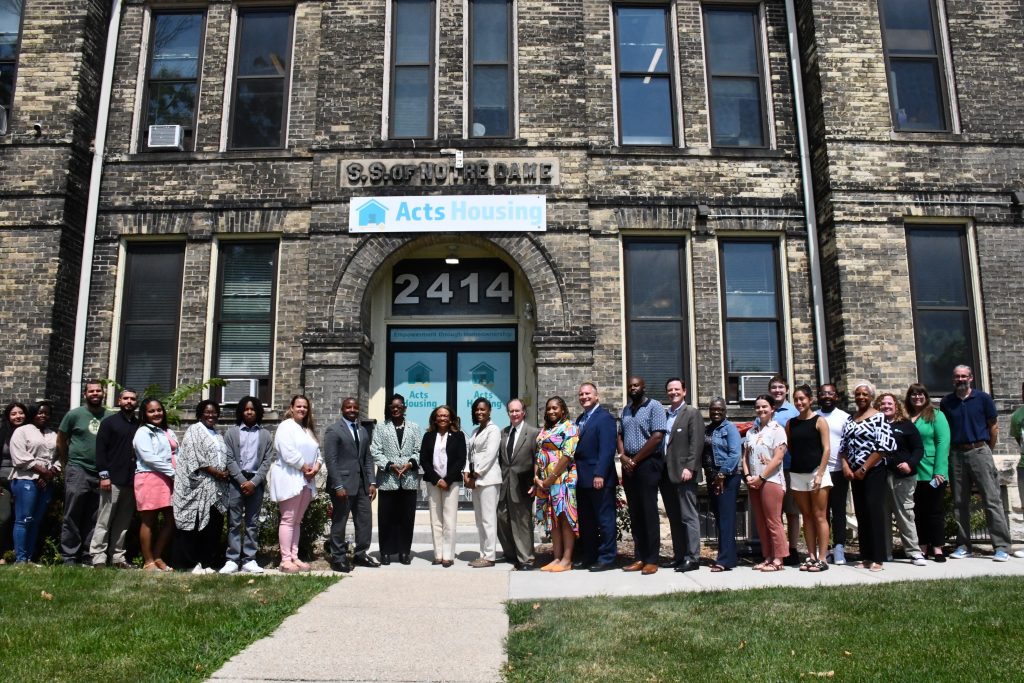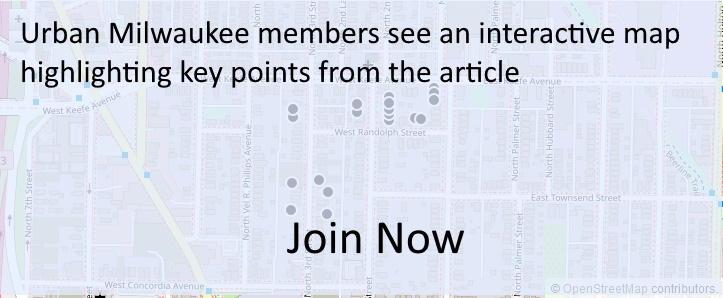HUD Launches $100 Million Competitive Home Fund in Milwaukee
HUD acting secretary tours city's affordable housing, gets feedback on federal program.

Mayor Cavalier Johnson, Congresswoman Gwen Moore and Acting HUD Secretary Adrianne Todman pose with members of ACTS Housing, HUD employees. Photo by Jeramey Jannene.
The U.S. Department of Housing and Urban Development (HUD) is ready to give cities and states cash to make it easier to develop new homes.
“One of the reasons there are high housing costs is we just don’t have enough places for people to live,” said HUD Acting Secretary Adrianne Todman during a visit to Milwaukee Tuesday.
This city was chosen to publicize the program, Pathways to Removing Obstacles to Housing or PRO Housing, which is entering its second round with $100 million in funding available to cities across the country. In June, the City of Milwaukee won $2.1 million from the first round of the program’s funding to further develop its Growing MKE zoning plan, which is intended to make it easier to build denser housing in targeted areas.
An additional $250 million “Legacy Challenge” fund is also available for “transformative housing investments.” A HUD press release describes it as a loan guarantee program.
Todman was also here “to see firsthand some of the amazing innovation happening here in Milwaukee,” she said, following a tour of the McKinley School Lofts.
The condition of the former William McKinley School, which sat fire-damaged for years, was previously described as the “worst we’ve ever seen” by Gorman & Company officials and the “quintessential definition of blight” by area Alderman Robert Bauman.
But Gorman, with a mix of city and federal support, redeveloped the building into 39 affordable apartments for military families. The redevelopment was completed in 2023, with families with qualifying incomes able to move in at rent prices targeted not to exceed 30% of their household income.
Gorman, said Wisconsin Market President Ted Matkom, is now finishing the “special part.” Four single-family homes, subsidized in part by the city, are being constructed on a portion of the former parking lot along W. Vliet Street.
“For years I’ve been terrified, as it just lay wasted, that it would be torn down,” said Congresswoman Gwen Moore. She’s personally connected to the structure. She went to grade school at McKinley when it was part of Milwaukee Public Schools, and after it was sold to VE Carter Child Development Corporation, her sons attended daycare there. She now has a granddaughter who lives nearby, in a house the congresswoman once lived in.
Moore endorsed HUD’s commitment to building affordable, quality housing in urban areas. “I’m grateful that this is a housing option that’s not out on 107th and Lovers Lane. It’s right here in our community, right here with access to public transportation, walkable neighborhoods,” said the congresswoman.
Todman and Moore also met with employees of Acts Housing at the organization’s Midtown office, where she listened to issues the nonprofit organization is encountering with different programs. Mayor Cavalier Johnson joined that discussion, which involved more than two dozen people involved in housing acquisition, rehabilitation and home-buying counseling.
Todman said, based on feedback from organizations like Acts, the Federal Housing Administration began using “common sense things” such as on-time rent payments as a measure of creditworthiness to issue a mortgage. HUD also cut $800 million in costs related to mortgage insurance, she noted.
But Deatra Kemp, Acts’ vice president of programs, had plenty of ideas for other ways HUD could make it easier for Acts to help first-time homebuyers get into homes. That included more education about otherwise “great” HUD programs and refining downpayment assistance programs to work more smoothly with federally-backed loans. “There are too many layers of bureaucracy around it,” said Kemp. She called for more support from the city and federal government for unconventional new homes, like the early childhood educator program from the Community Development Alliance.
Kemp also said that federally backed city programs, including Strong Homes and a home buyer assistance program, need to be refined to close a loophole that blocks prospective owner-occupants from using the funding to renovate dilapidated homes. The programs, said Kemp, require the prospective owners to live in the house for a year before using the program, but the homes are often not ready for occupancy.
Acts CEO Michael Gosman and Vice President Dorothy York said federal funds from the Biden administration, ultimately allocated by the city and county, were key in launching Acts’ $10 million acquisition program. York said it has acquired 87 homes to date and found at least one seller who wanted to sell directly to Acts, for a fair price, instead of selling to a landlord. “We make cash offers where the families can’t,” said York of how Acts buys the homes in a competitive market and then resells them to owner-occupants.
Acts board member Rae Johnson, who bought the first home in her family’s history through Acts Housing four years ago, also told her story about how Acts and different programs enabled her to buy a house and rehabilitate it. “It’s been wonderful,” said Johnson. “It was really difficult, but it’s the best thing I’ve ever done.”
“I think your story is exactly the kind of story we need to bring back to DC,” said Todman.
After the meeting, she told Urban Milwaukee that the meeting was a “sign that there is more work to do.” But she said it was encouraging to meet homeowners like Johnson who had taken advantage of homebuyer assistance programs. “It still begs the question about what else we need to do?… But what I’m excited about is some of the innovation that is being done using HUD funds and HUD programs.”
She credited the city’s Growing MKE application, which won the June funding award, with being the type of innovation HUD wants to see. She praised the “intentionality” in the plan for promoting more homeownership options in different building types and the hope that it would help minority communities that have long had lower homeownership rates. The city is expected to use some of the funding to support pilot programs of different “missing middle” housing options.

Existing members must be signed in to see the interactive map. Sign in.
If you think stories like this are important, become a member of Urban Milwaukee and help support real, independent journalism. Plus you get some cool added benefits.
More about the Growing MKE proposal
- Milwaukee Seeks ‘Missing Middle’ Housing Developers - Jeramey Jannene - Nov 24th, 2025
- Milwaukee Aims To Build ‘Missing Middle’ Housing in 2026 - Jeramey Jannene - Oct 29th, 2025
- Despite Its Passage, ‘Growing MKE’ Still Not A Done Deal - Jeramey Jannene - Sep 16th, 2025
- Mayor Signs Housing Legislation, Praises Late Jonathan Brostoff - Jeramey Jannene - Jul 16th, 2025
- Council Adopts Growing MKE Plan - Jeramey Jannene - Jul 15th, 2025
- After Lengthy Debate, Council Legalizes Carriage Homes - Jeramey Jannene - Jul 15th, 2025
- Housing Plan Wins Key Council Committee Endorsement - Jeramey Jannene - Jul 9th, 2025
- City Hall: Committee Waters Down Proposed ‘Granny Flat’ Plan - Jeramey Jannene - Jun 17th, 2025
- Madison Pursuing Its Own Zoning Reform Similar To ‘Growing MKE’ - Sarah Lehr - Jun 12th, 2025
- ‘Growing MKE’ Proposal Picks Up Key Endorsement - Jeramey Jannene - Jun 2nd, 2025
Read more about Growing MKE proposal here
Political Contributions Tracker
Displaying political contributions between people mentioned in this story. Learn more.
- September 16, 2024 - Cavalier Johnson received $500 from Ted Matkom
- February 20, 2016 - Cavalier Johnson received $250 from Robert Bauman






















Why must vacated MPS schools remain so for a period of time, before they can be converted into housing. What law(s) require that “charter” schools have first dibs on these buildings?
@mpbehar – That two-year requirement is imposed by state law and is only triggered once a property is declared surplus.
Thank you Jeramey!